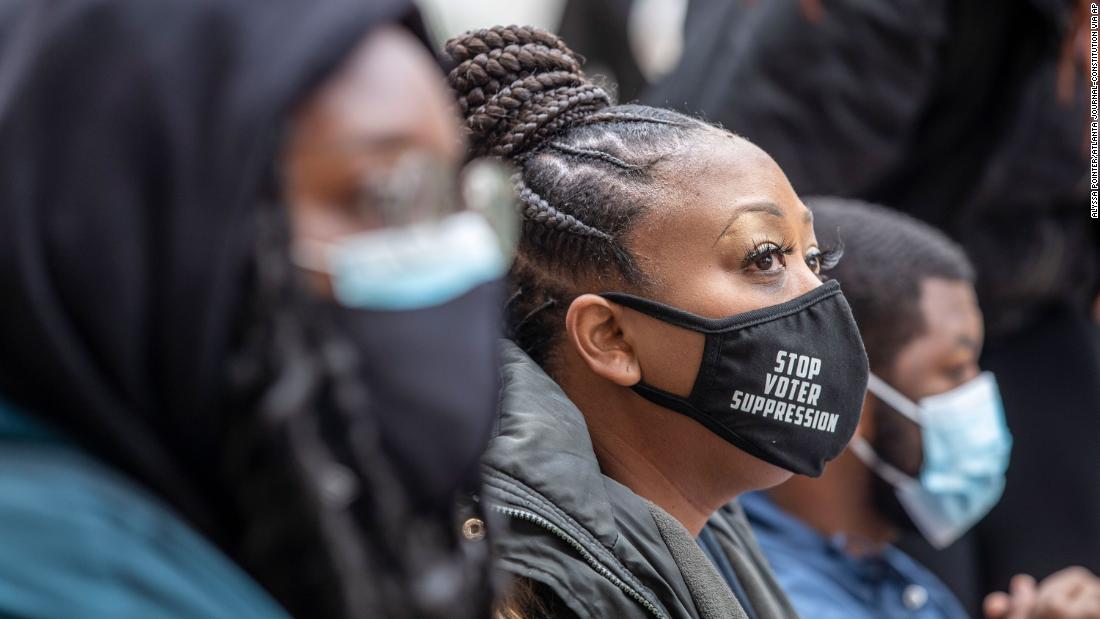His efforts, however, can be reversed by bills backed by Republicans advancing in the Georgia Legislature that, according to activists, are reminiscent of tactics used to prevent blacks from voting in the South during the Jim Crow era.
“We know your targets are black voters,” said Cliff Albright, co-founder of the Atlanta-based Black Voters Matter. “These (legislative) notes are dripping in the blood of Jim Crow.”
Black Voters Matter, Georgia NAACP, New Georgia Project and other civil rights groups are now in a battle to protect black voting power, launching a campaign this week to prevent voter restrictions from advancing.
They are also demanding that Congress pass federal voting rights legislation that would reverse state laws.
The controversy over voting rights comes when the civil rights community celebrates the 56th anniversary of “Bloody Sunday” this weekend for the first time without the voting icon John Lewis, who died last year. Lewis was praised as a hero who fought tirelessly for equal voting rights for blacks. Voting rights leaders have pledged to keep their legacy alive.
The Georgia State House passed a bill this week that includes several measures that restrict access to voting, including a ban on automatic voter registration, a limit on early voting and ballot boxes on Sunday, and a series of restrictions and voting requirements. identification for the absent vote. The bills come after former President Donald Trump made unsubstantiated allegations of a fraudulent 2020 election, saying there was widespread electoral fraud in Georgia.
“Clearly, the attack is based on when and how they know that black voters are being mobilized to attend,” said Albright. “They know that they cannot win the elections if we really expand access to the vote or even if we just maintain it.”
Martin Luther King III, the eldest son of the late Reverend Martin Luther King Jr. and Coretta Scott King, said the Republican-backed measures are a more “sophisticated” version of Jim Crow’s practices that prevented blacks from voting. For example, he noted that many blacks were forced to take literacy tests that were impossible to pass to vote during the Jim Crow era. They are now being suppressed with shorter voting hours and limited days, he said.
“I think it certainly goes back to the Jim Crow era because it has a racist tone,” said King. “You target communities of color and, historically, the African American community has voted in general for Democrats.”
A national effort to ‘Protect Our Power’
Some black voters in Georgia say the measures are disheartening and could affect turnout.
Calvin Payne of Vinings, Georgia, said that many black voters cannot afford to miss work or stand in line for hours to vote, so they need expanded access.
“I just think it’s ridiculous,” said Payne. “When we complicate things, that’s when people say, ‘OK, I don’t need to vote.’ ”
Albright’s Black Voters Matter and other groups are holding rallies, printing ads across the state, running bank campaigns over the phone and seeking support from businesses and corporations to promote their efforts to prevent state laws from advancing.
Georgia’s proposals reflect Republican-backed voting bills that have emerged across the country. In February, state lawmakers in 43 states had submitted more than 250 bills with restrictive voting clauses, according to a count by the Brennan Center for Justice at New York University.
Black lawmakers and leaders promise to protect voting rights
National Urban League President Marc Morial released a statement asking the Senate to act on HR 1.
“We watched with dismay when state lawmakers across the country responded to the record turnout among voters of color with aggressive and racially motivated restrictions on voting,” said Morial. “The House of Representatives admirably opposed this anti-democracy movement last night by approving a broad expansion of voting rights contained in the People’s Law. Now the Senate must do the same.”
Senate Democrats told reporters on Wednesday that they are determined to pass legislation to protect the right to vote. Senator Raphael Warnock of Georgia called state measures led by Republicans “undemocratic.”
“We must be clear: it is not your job as politicians to choose your voters. It is the job of voters to choose who will represent them,” Warnock said during a virtual round table for black journalists. “We will be working hard to pass the People’s Law (and) the John Lewis Advance on Voting Rights Act to restore vital voting protections and expand access to voting, and we will fight every day to get it done.”
Georgia’s NAACP President James Woodall said the voting restrictions that advance in the state chamber are unfair and could potentially violate existing federal voting rights laws. Woodall said his NAACP chapter is prepared to take legal action if necessary.
“We need to create a situation where elections are not only safe, secure and accessible, but also in compliance with federal law,” said Woodall.
CNN’s Annie Grayer, Clare Foran and Dan Merica contributed.
